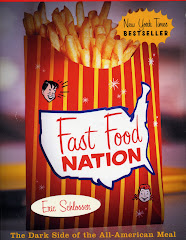How does the amount spent on fast food compare with the amount spent on other things in our society?
- Americans spent 6 billion on fast food in 1970. We spent 110 million on fast food in 2001. And now, we spent 145 million on fast food in 2009. This is more than we spend on movies, books, magazines, newspapers, videos, and recorded music combined, according to Eric Schlosser. This spending facilitates an incredible socio-economic trend that will inevitably take over the American life. If we spend more on fast food than higher education, technology, or cars, our already-failing industries will be run to the ground by the monopolization of our market through fast food.
Why is fast food worth studying?
- As I stated before, the socio-economic trend erupting from the impact of fast food on the American market is staggering. Fast food, with its massive resources, has seeped into every aspect of our lives, attempting to influence us from the day we're born to the day we die. It has become a fixated part of our lifestyles. Never before has food undergone such massive commodification, throughout history, and the impact on our entire culture is impressive. Therefore, studying the monopolizing commodity may help us understand our culture system. Fast food is the most noted part of our culture that we didn't steal from another culture, like many of our so-called "American cultural traits" such as football. It may help us predict the future of our economy and better prepare for it.
According to the author, why did he write this book?
- He wrote this book, because, " out of a belief that people should know what lies behind the happy, shiny surface or every fast food transaction." He did not write it to try and ruin the fast food industry, or endorse it, he simply wrote it to inform of the truths behind the industry. Fast food is such a broad, fascinating subject, and in reality, all we see, as consumers, masks the truth of the inner machinations of these titans of fast food. Where does the meat really come from? Why does it taste so good? And why is the marketing so effective? Eric poses and answers each of these questions, and more, to inform the American public of the fast food industry.

Interesting bio! I hope you're joking of course.
ReplyDeleteGreat job. Good use of details and insights. I agree with you on all points. Fast food is a fascinating subject and gives us great insight into our culture. Unfortunately, you're probably right that this is a culture trait. What does that say about us? We gave the world democracy, the airplane, and oh yeah - greasy fries! What do you think about the book so far? Has it at least made you think a little about our food supply system? Read on.